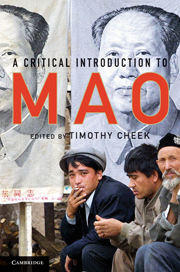Book contents
- Frontmatter
- Contents
- List of Illustrations
- About the Contributors
- Preface
- Acknowledgments
- Timeline of Twentieth-Century China
- Maps
- Part I Mao's World
- 1 Mao, Revolution, and Memory
- 2 Making Revolution in Twentieth-Century China
- 3 From Urban Radical to Rural Revolutionary: Mao From the 1920s to 1937
- 4 War, Cosmopolitanism, and Authority: Mao from 1937 to 1956
- 5 Consuming Fragments of Mao Zedong: The Chairman's Final Two Decades at the Helm
- 6 Mao and His Followers
- 7 Mao, Mao Zedong Thought, and Communist Intellectuals
- 8 Gendered Mao: Mao, Maoism, and Women
- 9 Mao the Man and Mao the Icon
- Part II Mao's Legacy
- Appendix: Selected Further Readings (Annotated)
- Index
- References
1 - Mao, Revolution, and Memory
Published online by Cambridge University Press: 05 August 2012
- Frontmatter
- Contents
- List of Illustrations
- About the Contributors
- Preface
- Acknowledgments
- Timeline of Twentieth-Century China
- Maps
- Part I Mao's World
- 1 Mao, Revolution, and Memory
- 2 Making Revolution in Twentieth-Century China
- 3 From Urban Radical to Rural Revolutionary: Mao From the 1920s to 1937
- 4 War, Cosmopolitanism, and Authority: Mao from 1937 to 1956
- 5 Consuming Fragments of Mao Zedong: The Chairman's Final Two Decades at the Helm
- 6 Mao and His Followers
- 7 Mao, Mao Zedong Thought, and Communist Intellectuals
- 8 Gendered Mao: Mao, Maoism, and Women
- 9 Mao the Man and Mao the Icon
- Part II Mao's Legacy
- Appendix: Selected Further Readings (Annotated)
- Index
- References
Summary
I think my first impression – dominantly one of native shrewdness – was probably correct. And yet Mao was an accomplished scholar of Classical Chinese, an omnivorous reader, a deep student of philosophy and history, a good speaker, a man with an unusual memory and extraordinary powers of concentration, an able writer, careless in his personal habits and appearance but astonishingly meticulous about details of duty, a man of tireless energy, and military and political strategist of considerable genius.
Edgar Snow, Red Star Over China (1937)Psychologists of mass behavior might have an explanation for what went wrong in China in the late summer of 1958. China was struck with a mass hysteria fed by Mao, who then fell victim himself.… Mao's earlier skepticism had vanished. Common sense escaped him. He acted as though he believed the outrageous figures for agricultural production. The excitement was contagious. I was infected, too.
Li Zhishi, The Private Life of Chairman Mao (1994)Beijing relies on the [Party] Center,
Shanghai on its connections,
Guangzhou leans on Hong Kong,
The drifting population lives by Mao Zedong Thought.
Popular ditty in China among working poor, 1990sMao Zedong has always come to us through stories. Some reflect fragments of personal experience, some seek to weave a sensible historical narrative, and some promote a myth that serves other interests. The stories began in the 1930s, and they keep coming today. The stories do not match generally because different authors seek to demonstrate different conclusions.
- Type
- Chapter
- Information
- A Critical Introduction to Mao , pp. 3 - 30Publisher: Cambridge University PressPrint publication year: 2010
References
- 3
- Cited by



